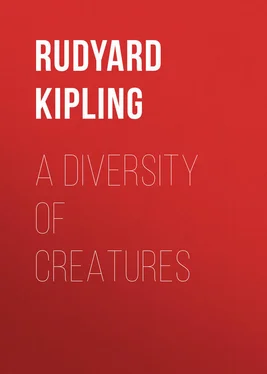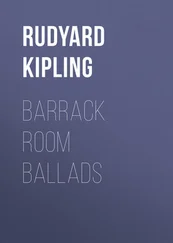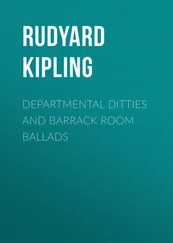Rudyard Kipling - A Diversity of Creatures
Здесь есть возможность читать онлайн «Rudyard Kipling - A Diversity of Creatures» — ознакомительный отрывок электронной книги совершенно бесплатно, а после прочтения отрывка купить полную версию. В некоторых случаях можно слушать аудио, скачать через торрент в формате fb2 и присутствует краткое содержание. Жанр: foreign_antique, foreign_prose, foreign_sf, на английском языке. Описание произведения, (предисловие) а так же отзывы посетителей доступны на портале библиотеки ЛибКат.
- Название:A Diversity of Creatures
- Автор:
- Жанр:
- Год:неизвестен
- ISBN:нет данных
- Рейтинг книги:5 / 5. Голосов: 1
-
Избранное:Добавить в избранное
- Отзывы:
-
Ваша оценка:
- 100
- 1
- 2
- 3
- 4
- 5
A Diversity of Creatures: краткое содержание, описание и аннотация
Предлагаем к чтению аннотацию, описание, краткое содержание или предисловие (зависит от того, что написал сам автор книги «A Diversity of Creatures»). Если вы не нашли необходимую информацию о книге — напишите в комментариях, мы постараемся отыскать её.
A Diversity of Creatures — читать онлайн ознакомительный отрывок
Ниже представлен текст книги, разбитый по страницам. Система сохранения места последней прочитанной страницы, позволяет с удобством читать онлайн бесплатно книгу «A Diversity of Creatures», без необходимости каждый раз заново искать на чём Вы остановились. Поставьте закладку, и сможете в любой момент перейти на страницу, на которой закончили чтение.
Интервал:
Закладка:
'So we pooked him back into the middle of the brook, an' we saw he went round the elber 'thout balkin', an' we walked quite a piece beside of him to set him on his ways. When we couldn't see no more, we went home by the high road, because we knowed the brook 'u'd be out acrost the medders, an' we wasn't goin' to hunt for Jim's little rotten old bridge in that dark-an' rainin' Heavens' hard, too. I was middlin' pleased to see light an' vittles again when we got home. Jim he pressed me to come insides for a drink. He don't drink in a generality, but he was rid of all his troubles that evenin', d'ye see? "Mother," he ses so soon as the door ope'd, "have you seen him?" She whips out her slate an' writes down-"No." "Oh, no," ses Jim. "You don't get out of it that way, mother. I lay you have seen him, an' I lay he's bested you for all your talk, same as he bested me. Make a clean breast of it, mother," he ses. "He got round you too." She was goin' for the slate again, but he stops her. "It's all right, mother," he ses. "I've seen him sense you have, an' he won't trouble us no more." The old lady looks up quick as a robin, an' she writes, "Did he say so?" "No," ses Jim, laughin'. "He didn't say so. That's how I know. But he bested you , mother. You can't have it in at me for bein' soft-hearted. You're twice as tender-hearted as what I be. Look!" he ses, an' he shows her the two sovereigns. "Put 'em away where they belong," he ses. "He won't never come for no more; an' now we'll have our drink," he ses, "for we've earned it."
'Nature-ally they weren't goin' to let me see where they kep' their monies. She went upstairs with it-for the whisky.'
'I never knowed Jim was a drinkin' man-in his own house, like,' said Jabez.
'No more he isn't; but what he takes he likes good. He won't tech no publican's hogwash acrost the bar. Four shillin's he paid for that bottle o' whisky. I know, because when the old lady brought it down there wasn't more'n jest a liddle few dreenin's an' dregs in it. Nothin' to set before neighbours, I do assure you.'
'"Why, 'twas half full last week, mother," he ses. "You don't mean," he ses, "you've given him all that as well? It's two shillin's worth," he ses. (That's how I knowed he paid four.) "Well, well, mother, you be too tender-'carted to live. But I don't grudge it to him," he ses. "I don't grudge him nothin' he can keep." So, 'cardenly, we drinked up what little sup was left.'
'An' what come to Mary's Lunnon father?' said Jabez after a full minute's silence.
'I be too tired to go readin' papers of evenin's; but Dockett he told me, that very week, I think, that they'd inquested on a man down at Robertsbridge which had poked and poked up agin' so many bridges an' banks, like, they couldn't make naun out of him.'
'An' what did Mary say to all these doin's?'
'The old lady bundled her off to the village 'fore her Lunnon father come, to buy week-end stuff (an' she forgot the half o' it). When we come in she was upstairs studyin' to be a school-teacher. None told her naun about it. 'Twadn't girls' affairs.'
'Reckon she knowed?' Jabez went on.
'She? She must have guessed it middlin' close when she saw her money come back. But she never mentioned it in writing so far's I know. She were more worritted that night on account of two-three her chickens bein' drowned, for the flood had skewed their old hen-house round on her postes. I cobbled her up next mornin' when the brook shrinked.'
'An' where did you find the bridge? Some fur down-stream, didn't ye?'
'Just where she allus was. She hadn't shifted but very little. The brook had gulled out the bank a piece under one eend o' the plank, so's she was liable to tilt ye sideways if you wasn't careful. But I pooked three-four bricks under her, an' she was all plumb again.'
'Well, I dunno how it looks like, but let be how 'twill,' said Jabez, 'he hadn't no business to come down from Lunnon tarrifyin' people, an' threatenin' to take away children which they'd hobbed up for their lawful own-even if 'twas Mary Wickenden.'
'He had the business right enough, an' he had the law with him-no gettin' over that,' said Jesse. 'But he had the drink with him, too, an' that was where he failed, like.'
'Well, well! Let be how 'twill, the brook was a good friend to Jim. I see it now. I allus did wonder what he was gettin' at when he said that, when I talked to him about shiftin' the stack. "You dunno everythin'," he ses. "The Brook's been a good friend to me," he ses, "an' if she's minded to have a snatch at my hay, I ain't settin' out to withstand her."'
'I reckon she's about shifted it, too, by now,' Jesse chuckled. 'Hark! That ain't any slip off the bank which she's got hold of.'
The Brook had changed her note again. It sounded as though she were mumbling something soft.
THE LAND
When Julius Fabricius, Sub-Prefect of the Weald,
In the days of Diocletian owned our Lower River-field,
He called to him Hobdenius-a Briton of the Clay,
Saying: 'What about that River-piece for layin' in to hay?'
And the aged Hobden answered: 'I remember as a lad
My father told your father that she wanted dreenin' bad.
An' the more that you neeglect her the less you'll get her clean.
Have it jest as you've a mind to, but, if I was you, I'd dreen.'
So they drained it long and crossways in the lavish Roman style.
Still we find among the river-drift their flakes of ancient tile,
And in drouthy middle August, when the bones of meadows show,
We can trace the lines they followed sixteen hundred years ago.
Then Julius Fabricius died as even Prefects do,
And after certain centuries, Imperial Rome died too.
Then did robbers enter Britain from across the Northern main
And our Lower River-field was won by Ogier the Dane.
Well could Ogier work his war-boat-well could Ogier wield his brand-
Much he knew of foaming waters-not so much of farming land.
So he called to him a Hobden of the old unaltered blood.
Saying: 'What about that River-bit, she doesn't look no good?'
And that aged Hobden answered: ''Tain't for me to interfere,
But I've known that bit o' meadow now for five and fifty year.
Have it jest as you've a mind to, but I've proved it time on time,
If you want to change her nature you have got to give her lime!'
Ogier sent his wains to Lewes, twenty hours' solemn walk,
And drew back great abundance of the cool, grey, healing chalk.
And old Hobden spread it broadcast, never heeding what was in't;
Which is why in cleaning ditches, now and then we find a flint.
Ogier died. His sons grew English. Anglo-Saxon was their name,
Till out of blossomed Normandy another pirate came;
For Duke William conquered England and divided with his men,
And our Lower River-field he gave to William of Warenne.
But the Brook (you know her habit) rose one rainy Autumn night
And tore down sodden flitches of the bank to left and right.
So, said William to his Bailiff as they rode their dripping rounds:
'Hob, what about that River-bit-the Brook's got up no bounds?'
And that aged Hobden answered: ''Tain't my business to advise,
But ye might ha' known 'twould happen from the way the valley lies.
When ye can't hold back the water you must try and save the sile.
Hev it jest as you've a mind to, but, if I was you, I'd spile!'
They spiled along the water-course with trunks of willow-trees
And planks of elms behind 'em and immortal oaken knees.
And when the spates of Autumn whirl the gravel-beds away
You can see their faithful fragments iron-hard in iron clay.
Интервал:
Закладка:
Похожие книги на «A Diversity of Creatures»
Представляем Вашему вниманию похожие книги на «A Diversity of Creatures» списком для выбора. Мы отобрали схожую по названию и смыслу литературу в надежде предоставить читателям больше вариантов отыскать новые, интересные, ещё непрочитанные произведения.
Обсуждение, отзывы о книге «A Diversity of Creatures» и просто собственные мнения читателей. Оставьте ваши комментарии, напишите, что Вы думаете о произведении, его смысле или главных героях. Укажите что конкретно понравилось, а что нет, и почему Вы так считаете.












